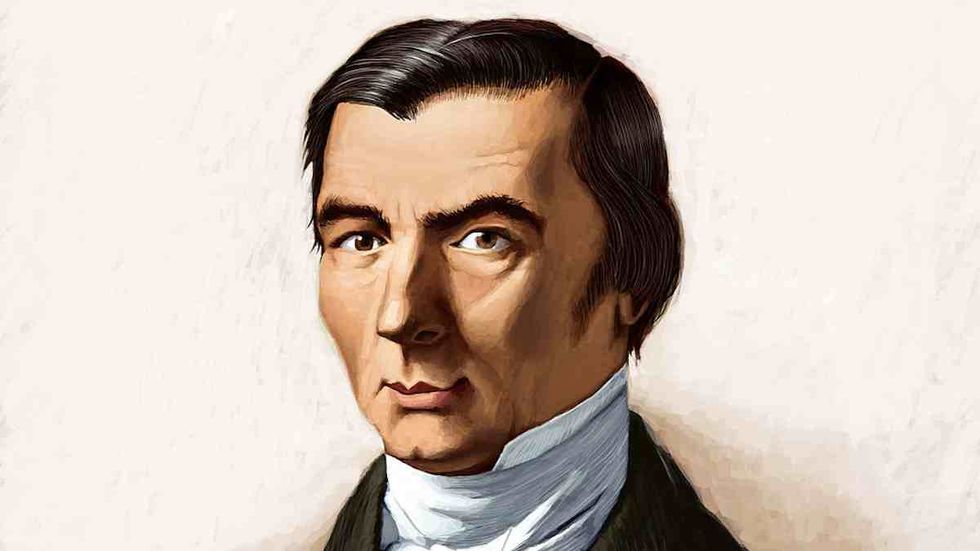
© 2024 Blaze Media LLC. All rights reserved.
When most people think about “conservative” economics, the name that immediately comes to mind is Adam Smith, the Scottish Enlightenment thinker famous for his description of the free market as being guided by an “invisible hand” that makes government regulation both unnecessary and unwise. There is indeed much to be said for Smith’s contributions to economic thought, but his theories have led to an equal number of fallacies and misconceptions, and in many ways opened the door for criticisms by interventionists like John Maynard Keynes, whose own brand of economic policy still blankets our country like a blight.
Today marks the anniversary of the birth of another economist, less well known but arguably more important than Smith, the French writer and statesman, Frederic Bastiat.
Where Smith’s observations are buried in hundreds of pages of dense, often unreadable prose, Bastiat is quick, witty, and to the point. He uses breezy satire to illustrate complex ideas, and displays a clarity of thought almost unique among even the greatest minds of his time. Like Smith with his invisible hand, Bastiat’s focus was on that which could not be seen, and his chief insight that bad economics relies on overlooking hidden outcomes in favor of more obvious ones.
One need only read one of Bastiat’s most famous essays, “What Is Seen and What Is Not Seen” to learn more about economics than most graduate students in the field will ever know. The point is an obvious one, and yet one that is almost universally ignored in public policy circles. The point is this: an economic policy that benefits one person may often disadvantage many others, and it is irresponsible to hold up the benefit as a gain without also acknowledging the costs.
Bastiat’s example is the famous parable of the broken window. He observes that, while a broken window does indeed provide work for glassmakers, we should not conclude from this that a policy of breaking windows will stimulate the economy, the reason being that the money used to repair the window could have been used to buy something else, such as a new pair of shoes. Where society might have had both a window and some shoes, it now only has a window, albeit to the delight of a few glaziers.
In 21st century America, the insight remains as relevant as ever, with presidents and pundits alike claiming that we can stimulate our economy by taking money from the taxpayers and spending it on things like infrastructure or the military, ignoring the fact that the taxpayers might have spent their own money in more productive ways, had they not been forced to give it to the government.
The broken window fallacy is Bastiat’s most famous insight, but it is far from his only one. In a particularly humorous piece titled “The Candlemakers’ Petition” he roasts the idea of economic protectionism for certain industries. In it, he argues satirically that, because mankind has access to the benefit of free light from sunrise till sunset, the makers of candles are at a severe competitive disadvantage, and that to protect them from the “unfair” competition posed by the sun, the government should consider blocking the darn thing out. The absurdity of such an argument is patently obvious, and yet many of us still struggle with the analogous argument that American automobile manufacturers need to be protected from cheap, foreign competition. If free sunlight is good for mankind, then so must be inexpensive cars.
Bastiat was more than just an exceptional writer. He was also a man of action, taking an active role in multiple revolutions in France, where he consistently fought for free trade, republicanism, and laissez-faire economic policy.
Today, Bastiat provides conservatives and libertarians with intellectual ammunition to stand against misguided policies like the Obama stimulus, bank bailouts, and now Trump’s protectionist leanings. We would all do well to revisit Bastiat’s work, and introduce him to those who have not yet read them on this day, his 216th birthday.
Want to leave a tip?
We answer to you. Help keep our content free of advertisers and big tech censorship by leaving a tip today.
Want to join the conversation?
Already a subscriber?
more stories
Sign up for the Blaze newsletter
By signing up, you agree to our Privacy Policy and Terms of Use, and agree to receive content that may sometimes include advertisements. You may opt out at any time.
© 2024 Blaze Media LLC. All rights reserved.
Get the stories that matter most delivered directly to your inbox.
By signing up, you agree to our Privacy Policy and Terms of Use, and agree to receive content that may sometimes include advertisements. You may opt out at any time.


